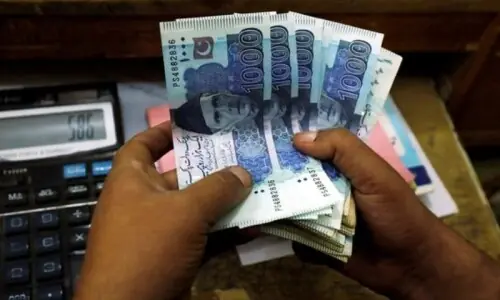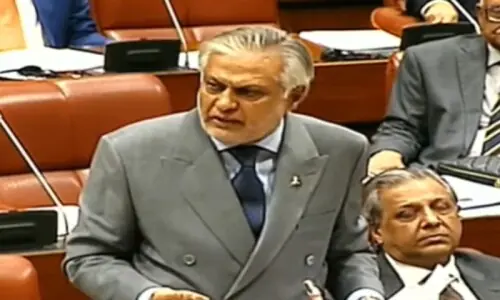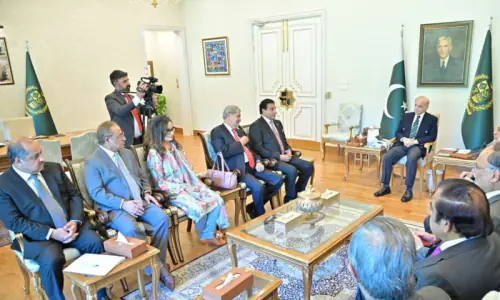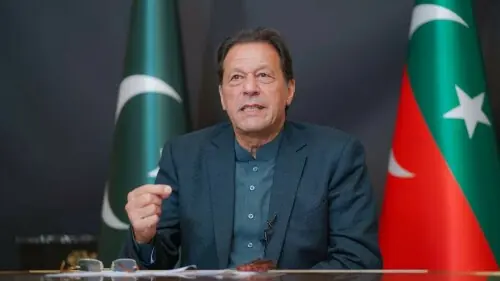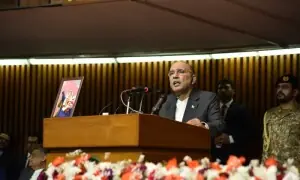In the past couple of weeks, politicians from several political parties have come together in a self-professed nonpartisan attempt to generate consensus for economic reforms. Given the magnitude of the economic crisis currently facing Pakistan, and the general lack of clear thinking about solutions, any and all such endeavours are welcome.
The composition of this ‘pressure group’ — an ex-prime minister and an ex-finance minister among its members — suggests it has more meaningful capacity to influence conversation, especially when compared to standard advocacy efforts for reform led by academics and development practitioners. Whether it’s able to move the needle within their own political parties, principally the PML-N, and influence actual decision-making in government is a separate matter.
This advocacy attempt also opens up a broader question: what would it take for a government, any government, to undertake reforms that could move the country out of socioeconomic stagnation. And yes, the problem is of both economic and social development. Pakistan has fallen behind regional countries not just in terms of economic growth over the past few decades, but also on a range of social indicators related to education, health, gender, and environmental sustainability.
In the short run, the usual discussion is that the government needs to take ‘unpopular’ measures. These include increasing consumption taxes, electricity and gas tariffs, and allowing depreciation of the rupee. The direct consequence of all these steps is inflationary, which is precisely why the unpopular tag is associated with them. In the medium to long run, the solution offered, including by members of the politicians’ pressure group, involve limiting the government’s footprint on the economy (mainly through privatisation and reduction of red tape), encourage greater investment from the private sector, and undertake productivity reforms that would allow the country to earn more foreign exchange (via foreign direct investment or exports).
‘Short-term pain’ needs to be made the centre of any reform conversation.
This particular set of solutions has been around for a while and its proponents can argue — with some accuracy — that it has never been fully implemented in Pakistan. Short periods of stabilisation often give way to deficit-financed, politically motivated splurges which then require painful stabilisation once again. This is the cycle that needs to be broken.
What deserves greatest scrutiny is this proposal for short-term ‘pain’. In fact, it needs to be made the centre of any reform conversation. Who is actually going to feel this pain? At the outset, let’s be clear that the brunt of inflation is always borne by the working poor. Since January 2019, inflation has clocked in at 70 per cent. With marginal real wage growth during this period, it means that for the vast majority of Pakistan’s 70 million workers, their economic position is considerably worse off than it was four years ago. Steps required to stave a balance-of-payments crisis will add to this pain. Even greater pain is in store if these steps are not taken. One can grudgingly accept the utter misfortune of the current impasse.
But what happens after this pain is administered? As mentioned earlier, the medium- to long-run steps involve stepping on toes other than those of the working poor. If the solution is privatising state-owned enterprises, that means taking on entrenched bureaucrats who hide behind the justified anger of public sector unions. If the solution is to move wealth towards productive use, it involves getting out of a national plot-and-file induced intoxication and challenging real estate developers. The same developers who not only finance every major political party, but given Pakistan’s unique political economy, actually run a large part of the state as well. And if productivity reforms are to be prioritised, it means weaning large, tariff-protected companies off state subsidies and forcing them to compete with the rest of the world.
All of these steps are painful too, but the pain is far more localised. The big difference is that, in the first instance, it directly hurts the powerful rather than the working poor. Is any political party and, equally importantly, the military interested in administering this targeted pain? Or are we content with cycles of rapid booms and busts, ie real estate gains for the wealthy and inflation for the asset-poor masses?
The reality is that every political party with a shot at forming the next government has kowtowed in front of one or several of these powerful groups. PML-N’s stints in the 1990s did okay in rowing back the state’s footprint in the economy but its obsession with the exchange rate directly caters to the interests of importers/traders and undermines productivity-led growth. PTI placed faith in a market-determined exchange rate, but then decided to chart out a growth strategy resting on pumping real estate and consumer credit. PPP’s 2008-2013 term was reasonable as far as export performance was concerned, but its reliance on public sector employment as a political strategy entirely hollows out actual government effectiveness.
The intelligentsia’s conversation around the economy tells us that a deal with the IMF is the only option. That the pain outside of an IMF programme is going to be greater than the pain because of it. These statements can be accepted as true in the absence of a reasoned counter, and they underscore the necessity and urgency of taking certain decisions. But it is important to move the conversation beyond the time frame of a few weeks/months. If well-intentioned politicians want to cultivate a national consensus for reform, the place to start would be to compel their own parties to end their political and financial dependence on groups that are responsible for the economic malaise. It would involve getting prepared for the more targeted pain that needs to be administered to the powerful, rather than the usual affliction on the working poor.
The writer teaches politics and sociology at Lums.
Twitter: @umairjav
Published in Dawn, January 23rd, 2023














